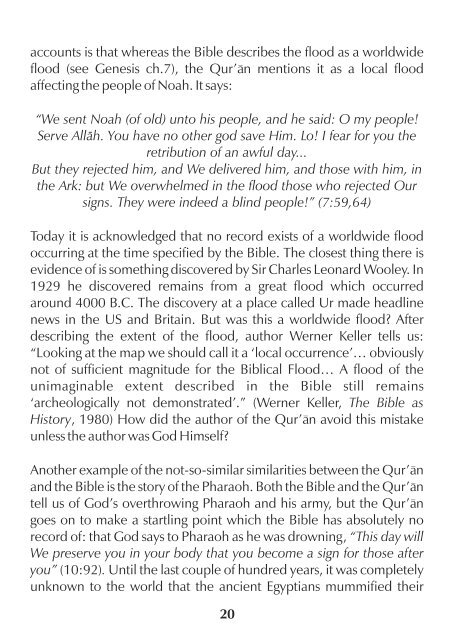Islam - The FAQ - Answering the Issues
http://www.islamicglobe.com
http://www.islamicglobe.com
Create successful ePaper yourself
Turn your PDF publications into a flip-book with our unique Google optimized e-Paper software.
accounts is that whereas <strong>the</strong> Bible describes <strong>the</strong> flood as a worldwide<br />
flood (see Genesis ch.7), <strong>the</strong> Qur’\n mentions it as a local flood<br />
affecting <strong>the</strong> people of Noah. It says:<br />
“We sent Noah (of old) unto his people, and he said: O my people!<br />
Serve All\h. You have no o<strong>the</strong>r god save Him. Lo! I fear for you <strong>the</strong><br />
retribution of an awful day...<br />
But <strong>the</strong>y rejected him, and We delivered him, and those with him, in<br />
<strong>the</strong> Ark: but We overwhelmed in <strong>the</strong> flood those who rejected Our<br />
signs. <strong>The</strong>y were indeed a blind people!” (7:59,64)<br />
Today it is acknowledged that no record exists of a worldwide flood<br />
occurring at <strong>the</strong> time specified by <strong>the</strong> Bible. <strong>The</strong> closest thing <strong>the</strong>re is<br />
evidence of is something discovered by Sir Charles Leonard Wooley. In<br />
1929 he discovered remains from a great flood which occurred<br />
around 4000 B.C. <strong>The</strong> discovery at a place called Ur made headline<br />
news in <strong>the</strong> US and Britain. But was this a worldwide flood? After<br />
describing <strong>the</strong> extent of <strong>the</strong> flood, author Werner Keller tells us:<br />
“Looking at <strong>the</strong> map we should call it a ‘local occurrence’… obviously<br />
not of sufficient magnitude for <strong>the</strong> Biblical Flood… A flood of <strong>the</strong><br />
unimaginable extent described in <strong>the</strong> Bible still remains<br />
‘archeologically not demonstrated’.” (Werner Keller, <strong>The</strong> Bible as<br />
History, 1980) How did <strong>the</strong> author of <strong>the</strong> Qur’\n avoid this mistake<br />
unless <strong>the</strong> author was God Himself?<br />
Ano<strong>the</strong>r example of <strong>the</strong> not-so-similar similarities between <strong>the</strong> Qur’\n<br />
and <strong>the</strong> Bible is <strong>the</strong> story of <strong>the</strong> Pharaoh. Both <strong>the</strong> Bible and <strong>the</strong> Qur’\n<br />
tell us of God’s overthrowing Pharaoh and his army, but <strong>the</strong> Qur’\n<br />
goes on to make a startling point which <strong>the</strong> Bible has absolutely no<br />
record of: that God says to Pharaoh as he was drowning, “This day will<br />
We preserve you in your body that you become a sign for those after<br />
you” (10:92). Until <strong>the</strong> last couple of hundred years, it was completely<br />
unknown to <strong>the</strong> world that <strong>the</strong> ancient Egyptians mummified <strong>the</strong>ir<br />
20














